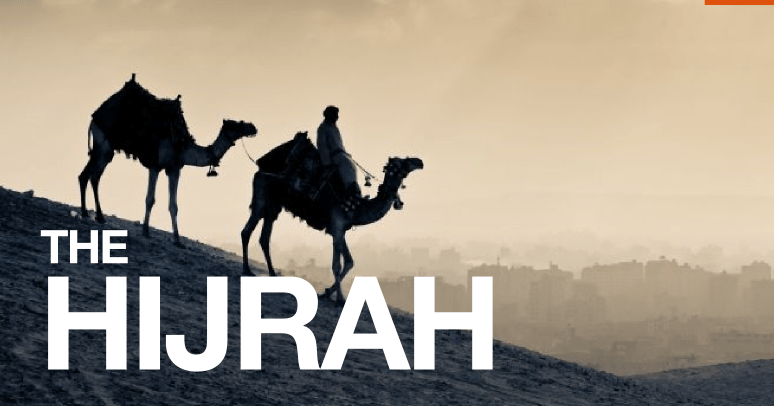Hijrah 1444: The meaning and ‘meaning of meaning’ of migration (III)
But the Hijrah of the Prophet from Makkah to Madinah did not and could not even have taken place the way it did without the resolution of matters which directly hinged on the personality of the Other Muhammad. In other words, two types of Muhammad were known to the Makkans before the Hijrah: the Muhammad […]

But the Hijrah of the Prophet from Makkah to Madinah did not and could not even have taken place the way it did without the resolution of matters which directly hinged on the personality of the Other Muhammad. In other words, two types of Muhammad were known to the Makkans before the Hijrah: the Muhammad who claimed to be a Prophet and the Muhammad who was an embodiment of virtues and trustworthiness. The “first” Muhammad was hated for his declaration that there is no god but the Almighty; the ‘second’ Muhammad was loved for being virtuous, kind and a peace-maker; the ‘first’ Muhammad was the one the Makkans believed had to be fought; the ‘second’ was the one in whom the Makkans would entrust their loftiest treasures. But in reality, there could be no separation between Muhammad, the Prophet and Muhammad who was the epitome of highest moral character.
In other words, contrary to the wish of the Makkans, it was not possible for the Muhammad, son of Abdullah to be Prophet ab initio if he could not measure up to the minimum standard of probity, honesty, and trustworthiness. You cannot lay any claim to be Muslim if your moral currency is weak; he is not a Muslim who betrays people’s trust.
- 69 abducted victims rescued in Bauchi’s bandits’ den
- 2023: GPF, CPAD take violence-free campaign to police, motor parks
Thus, on the night of his departure from Makkah, he asked his cousin to help him return the treasures which the Makkans had kept with him while they were relating to him as Muhammad son of Abdullah, not as Muhammad the Prophet of the Almighty. To emigrate for His sake, therefore, meant to be free of all of the obligations that are capable of rendering the Hijrah a nugatory; that in a state of oppression, the religion of Islam demands equity from the oppressed to the oppressor even if the latter does not and would not come to equity with open hands. By ensuring that Ali b. Abi Talib stayed behind in order to assist him to return the trusts to their owners, the Prophet was leaving behind a patrimony: in a state of attrition, the Islamic timeless values of honesty and trustworthiness cannot be sacrificed on the altar of spiritual vocation. In essence, to take what belongs to the unbelievers or the masses in an unjust manner is the very antithesis of the spirit of emigration.
Thus, the journey to Madinah became an open track with unknowable and inestimable possibilities. The Prophet began the journey in the full knowledge that he was leading humanity from service to humanity to the service of the Almighty. The Hijrah essays the importance of the emergence of a global leader who would emigrate with humanity from the heinous theatre of ethnicity and profanity to the Eldorado of religiosity and equality.
Eventually they began the journey to Madinah. The distance between Makkah and Madinah was strewn with fear and uncertainty; but the Madinah, the destination, was a paradise awaiting those who were ready to overcome the temporary and empty ministrations of Shaytan. Put differently, the distance between Makkah and Madinah was like an open space and one in which the enemy was ready to appropriate; but it was also a closed space for those who had an unshakeable faith in Him, the Almighty.
Once he became aware that the enemy was behind, he told his companion that they should enter the cave- the cave of Thawr. Face to face with the enemies, the Prophet told his friend and companion, ‘don’t grief! He is with us”. Face to face with the challenges of life, and in between the Makkah of our lives and the Madinah awaiting us, are we also ready to tell our companions: ‘don’t grief! He is with us?’. Face to face with the challenges of life and in-between our ‘Makkah’ of today – the ‘Makkah’ that is represented in yet to be fulfilled earthly desires- are we ready to look our spouses, friends, kith and kin in the eyes and say: ‘don’t grief! He is with us”?
Eventually, he arrived Madinah. The Prophet arrived Madinah after a tortuous journey across the arid desert of Arabia. But his arrival to Madinah only meant the beginning and the consolidation of what Islam can mean and what it could mean since every vocation is beset with the temptation of its purposes. His arrival to Madinah also meant the emergence of new identities within the nation of Islam. His arrival to Madinah equally meant the preparation for his return to Makkah. Now let us try to unpack the semiotics of these readings.
